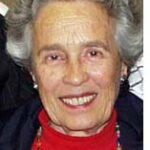By Eileen Wingard

SAN DIEGO — Although there was a notable sigh of disappointment when it was announced that the scheduled soloist for the evening, 92-year-old jazz cellist Fred Katz, was ill and unable to perform, the audience was well-compensated with two outstanding substitutes, woodwind jazz artist Norbert Sachel, who flew in from New York City, and San Diego’s world-renowned string bass player and teacher, Burt Turetsky.
The moment Sachel sounded the long, low clarinet note of the first number , set to the tremolo introduction of the strings of Hot Pstromi , we could sense that this was a musician of substance who knew how to project deep feeling and boundless energy. Dressed in black trousers and a rainbow-striped shirt, he stood out against the all-black outfits of the rest of the band at the Klezmer Summit at the Lyceum Theatre. Only leader Yale Strom had a different dress: jacket, slacks, tie and a derby hat, looking as if he had just stepped out of the 40’s.
After the exuberant opening selection, Elizabeth Schwartz came on stage to sing a Yiddish song about the sweat shops. The deep resonance of her voice created just the right mood of sadness to the tale describing the oppressive working conditions a new immigrant faced and the solace he found being with his beloved.
A catchy Ukranian melody followed, with impressive licks by drummer, Duncan Moore, and accordionist, Lou Fanucchi, as well as Satchel on clarinet.
Schwartz then rendered a heartfelt “Yiddishe Mame ” in both Yiddish and English. Hot Pstromi supplied a tango beat to the moving words. I am sure mine were not the only eyes that welled up as I listened to the emotional lyrics, so passionately intoned by Schwartz: “durch wasser un fayer, vet zi gelofen fir ir kind,” (through water and fire, she would run for her child), and concluding, “Di greste matoneh geshenkt fun Gott,” (the greatest gift given from God) “Iz ahn altishe Yiddishe Mame,” (Is an aged Jewish Mother). It brought back memories of my own Yiddish Mame and my grandmother, who were both the kind of self-sacrificing, devoted mothers described in the lyrics, and it brings to mind my own daughters who are fashioned in the same mold.
Next, Hot Pstromi’s wonderful string bass player, Jeff Pekarek, began an innovative version of the most popular Freilach. The audience clapped along to the familiar, joyous music.
The first half of the program concluded with a Turkish tune.
During intermission, the listeners enjoyed what has become a tradition for the Klezmer Summits, mini potato knishes topped with mustard and catered by Shmoozers.
The second half began with Turetsky performing an original piece on string bass, inspired by his mother’s life. Next, was a selection called “Way Down Yonder.” He concluded with a poem by the beat poet, Jack Kerouac, accompanying his dramatic recitation with music on the bass. Turetsky proved to be not only a master of his instrument, but an entertaining story teller.
Hot Pstromi regrouped on stage, this time, with jazz trumpet virtuoso, Gilbert Castellenos. The rest of the program consisted of jazz songs from the 30’s and 40’s, inspired by Yiddish lyrics. Some were, interestingly, written by black composers. First was a song with lyrics about matzo balls and gefilte fish. This was followed by “And the Angels Sing,” whose instrumental section picked up the tempo to a rollicking “freilach.” Next came Lina from Palestina, which included impressive riffs by trumpeter Castellenos and saxophonist Tripp Sprague. The program continued with Cab Calloway’s “Ot Azoi neyt a Shneider” (That’s the way the tailor sews), then the 1947 hit, “Mazel,” and culminated with the popular, “Bei Mir Bistu Shayn” (To me, you are beautiful). Schwartz rendered each of these jazz morsels with just the right character. During the instrumental sections, she gyrated her hips and wiggled her shoulders, showing her skills as an engaging jazz dancer, as well as a superb vocalist.
The audience included members of a Yiddish Group led by Lucy Goldman, people from the Mexican-Jewish community, which has more Yiddish speakers than among American-born Jews, and a large number from the Russian-Jewish community. There were also jazz lovers, klezmer afficionados, and fans of the versatile and talented Pstromi band leader, fiddler, composer, photographer, documentarian, film maker, anthropologist and author, Yale Strom.
As one audience member remarked, “It couldn’t have been better. I wish they had recorded it!”
*
Eileen Wingard is a freelance writer and retired violinist with the San Diego Symphony. She may be contacted at eileen.wingard@sdjewishworld.com